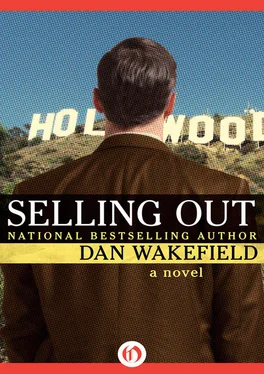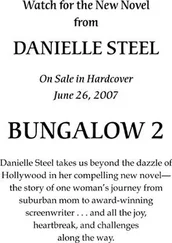What the hell could have happened?
Had the series been canceled even before it went on the air?
Had Archer Mellis resigned his post at Paragon in order to take over the Chrysler Corporation?
Had additional restrictions from the network’s Department of E. and A. provoked Ned Gurney into threatening the life of Stu Sturdivant?
Damn. You couldn’t leave the lot for an hour without missing out on some life-or-death crisis. Striding toward the building, but restraining himself from running until he knew what the hell was going on, and whether such panic was only an overreaction, Perry swore to himself he would never again stray off on his personal empire-building business during working hours. Just before he got to the building the cute little ten-year-old actress who was playing a neighbor of Jack and Laurie’s burst out of the building and started to dash past him, her pigtail flying. Maybe some tragedy had occurred on the set! Perry yelled after the little girl and grabbed her arm.
“Hey, what’s going on?” he asked.
“Christ, man,” the precocious tot piped up, “didn’t you read the trades this morning?”
“No, I didn’t,” he admitted shamefully to this one-year-old who had probably memorized the entire contents of Variety and the Hollywood Reporter over her Cocoa Pops that morning. “Why? What did they say?”
“We’re going on Friday night against ‘Dallas.’”
“You mean this show? ‘The First Year’s the Hardest’?”
“I don’t mean ‘The People’s Court,’” sighed the little girl, as she turned to run off toward the set.
“That’s impossible!” Perry yelled after her. “We’re an eight o’clock show!”
“Read it and weep!” the little tyke called back over her shoulder.
This was absurd. The kid must be pulling some kind of sick joke on him. Perry stood watching her receding pigtail a moment, then turned and ran full tilt toward the office.
“Where’s Ned?” Perry demanded in a kind of shout-screech, as he saw that the door to Gurney’s inner office was flung open and the room was empty. Ned’s secretary, looking so pale it seemed she had lost her suntan, said, “They’re all at Archer’s.”
Perry took off in a sprint.
It looked like rehearsal for a new Samuel Beckett play, or a civil defense emergency room. Ken Spires was lying on his back on the floor, with his feet propped up on a chair at a forty-five-degree angle. Ned Gurney was sitting in a corner with his legs drawn up close to his body and his head resting on his knees, murmuring in a trancelike chant, “It’s genocide, it’s genocide, it’s genocide …” Archer was pacing the room with the cordless phone cradled in his neck, saying, “Tell him I’ll be there anyway. I’ll be in his office waiting for him. If he’s not in his office I’ll be at his home. If he’s not at home I’ll be at his club. If he’s not at his club—”
Archer’s voice was extremely calm and modulated, and it was only his contrasting garb that seemed out of kilter. He was fitting gold cuff links into the starched striped dress shirt he wore with a regimental tie while he kept the phone receiver locked against his neck with his chin, but below the waist he had on only bikini undershorts, knee-length yellow sweat socks, and a pair of his hand-tooled cowboy boots. When his secretary rushed in with his darkest London suit, still in a cellophane cleaning bag, and a pair of highly polished black wing-tip shoes, Archer, still speaking into the phone receiver, hopped onto the edge of his desk and stuck out his legs. His secretary pulled off his cowboy boots, peeled off the yellow sweat socks, and handed him his black shoes and socks just as he was finishing his phone conversation—or rather, what seemed more like his monologue-edict to whomever he was speaking.
“You’ll never find him,” Ken Spires moaned fatalistically from the floor. “He’s hiding from you.”
“I’ll find him,” said Archer, slipping on the heavy trousers with the quick, certain facility of Clark Kent transforming himself into Superman in a phone booth.
“Find who?” Perry asked, drawing the first slight notice to himself from the others.
“Max Bloorman,” groaned Ken from the floor. “Who else would put us up against Dallas?”
“It’s genocide, it’s genocide, it’s genocide …” Ned continued chanting.
“What the hell happened to Amanda LeMay?” Perry shouted, hearing his voice crack. “She said the network was going to ‘nurture’ us.”
The word nurture seemed to snap Ned Gurney out of his trance. He uncoiled from his fetal crouch in the corner, sprang to his feet, and waved both arms in the air.
“Nurture!” he yelled. “I’ll show you what they mean by ‘nurture’!”
He grabbed Perry by the arm and led him to Archer’s desk, pointing to an empty spot on it.
“Look there. Imagine there’s a fly sitting there. OK? Now, we’re going to ‘nurture’ that fly. Just watch how we do it.”
Ned raised his right hand, sticking out the thumb, like a weapon, and, gritting his teeth, smashed the thumb down on the imaginary fly, pressing and grinding until it would have surely been obliterated into dust.
“We have just ‘nurtured’ that fly!” Ned exclaimed, then cackled wildly before returning to resume his crouch in the corner.
“But what about Amanda?” Perry persisted. “I really thought she cared about us. About the show.”
“That may have been her downfall,” said Ken.
“You mean she’s been demoted?” Perry asked incredulously.
“She’s gone into independent production,” Archer said, buttoning up the vest to his suit with sure, determined steadiness, like a knight putting on his armor.
“You mean she left us in the lurch to produce her own shows?” Perry asked with indignation.
A harsh, wild laugh came from Ken, who was still in his shock position on the floor.
“It means she’s been fired, you rube,” he said.
Perry didn’t even mind the put-down from the usually gentle Ken. In fact, he felt it fit. Who else but a rube would have sunk all his cash into a new condo with a mortgage of $3,000 a month, assuming his new series was going to be that one-in-a-million hit before it even went on the air—before it even had a specified time slot?
Not even live coverage of the Second Coming could compete against “Dallas” on Friday night at nine.
Perry slumped to the floor, joining his colleagues.
“Poor Amanda,” he said, for some reason finding it less painful to think of someone else’s ill fortune.
“Don’t worry about Amanda,” said Ned. “She’s swamped with offers.”
He moved out of his crouch and stretched out full length on the floor.
Only Archer Mellis was grimly functional. He poked his arms into the suit jacket his secretary held for him, grabbed his attaché case, and swung toward the door, glancing back to point a pistol-like finger at his fallen troops.
“I’ll try to get us shifted to a better slot,” he said, “but in the meantime, we’re on Friday night at nine, and let me remind you that J. R. Ewing is not just lying around on his butt right now. Let’s go!”
Like boxers trying to rise before the count of ten, the three men dizzily struggled to their feet.
“ Don’t think poor .”
Ravenna was squeezing Perry’s hand and staring into his eyes like a hypnotist.
When he frantically called her to lament, with quivering voice, the terrible news of his show being matched against “Dallas” and ask if it was too late to get out of his purchase and sale agreement for the condo, Ravenna ordered him to calm down and meet her for dinner. She wielded her growing influence to get them a reservation at Le Duc , the newest and suddenly most chic French restaurant in Hollywood, whose cachet was matched only by its prices.
Читать дальше












